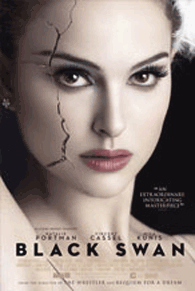
The story for those not in the know, is about a Princess cursed to turn into a White Swan by an evil sorcerer. When a Prince falls for her making the reversal of her spell possible, the sorcerer sends his seductive daughter, the “Black Swan” to lure the Prince away. Usually the two roles of the White and Black Swan are filled by the same dancer. The ballet’s artistic director, Thomas, played with a mix of foxy charm and lupine cruelty by Vincent Cassel, sees Nina fit the bill for the purer, more innocent White Swan, but demands she let herself go in order to be able to play the “Black Swan”.
Meanwhile, a challenger in the form of the more sexually forward and adventurous ballerina Lily (Mila Kunis) threatens Nina’s status as the troupe’s future prima ballerina, while the company’s former prima ballerina, the bitter Beth (Winona Ryder) skewers Nina verbally. To add to all of that, Nina’s home life isn’t exactly healthy, living with a single Mom/former ballerina (Barbara Hershey) whose relationship with Nina seems to resemble more a cross between a best girlfriend and a warm pillow of suffocating affection and admiration rather than a wise source of guidance.
In recent years, Darren Aronofsky has established himself as a more restrained but no less intense Cronenberg in being the pioneer of millennial body horror. The difference between the two, to this reviewer, is that Cronenberg hits you like a sledgehammer, where Aronofsky is a drill motor like the one the hapless protagonist of his remarkable debut, Pi, puts into his temple. Cronenberg spills all the blood and guts in forceful outbursts at regular intervals, where Aronofsky piles on the incremental damage, cutting long and deep. Here his approach ,when applied to the gruelling physical conditioning of ballet, fits like a glove, just as it did his previous film, The Wrestler. Professional wrestling is after all, the balletic choreography of raw physical violence, and ballet is the refined choreography of raw emotional violence.
The result is a film that hurls you along from the first frame to the last without ever letting go. Aronofsky’s skilled direction, the raw photography of his regular collaborator Matthew Libatique, and Andrew Weisblum’s razor-edged editing combine to form a film that leaves you breathless with its intense rhythm. However, all that is in the favour of a script by Mark Heyman and Andres Heinz that is at worst simplistic, seeming trotting out various tired cliches about the need and drive of artists to achieve transcendence by self-destruction. Such an examination of female hysteria as the product of stunted sexuality would not be out of place in a 19th Century medical textbook. How else to explain the scene where Thomas encourages Nina to undergo what would have been known as “pelvic massage” in Victorian times in order to “release” herself?
While Portman’s wide-eyed earnestness is probably what won the Academy over and got her the nomination at this year’s Oscars, anyone who’s missed Winona Ryder since her prime in the early to mid 90s won’t be disappointed by her short appearance. After her particularly messy trial for shoplifting charges, it’s good to see her back to stealing scenes instead of haute couture. Her Beth is a self-destructive cyclone and sets the mood and the stakes for the struggle that ballet dancers have to undergo.
Black Swan is above all an exquisite yet acquired taste; your mileage will vary much depending on whether you think seeing a man turn into a giant crow or a hall filled with talking paintings count as nightmarish or funny. Black Swan is simply a hysterical film, pun intended. It’s so go for broke that the first metaphor that came to my mind was not swan-related at all: it’s a film that tries to cook its goose, and eats it.












 Printable Version
Printable Version










Reader's Comments
is this what it takes to success as well?
Please log in to use this feature.